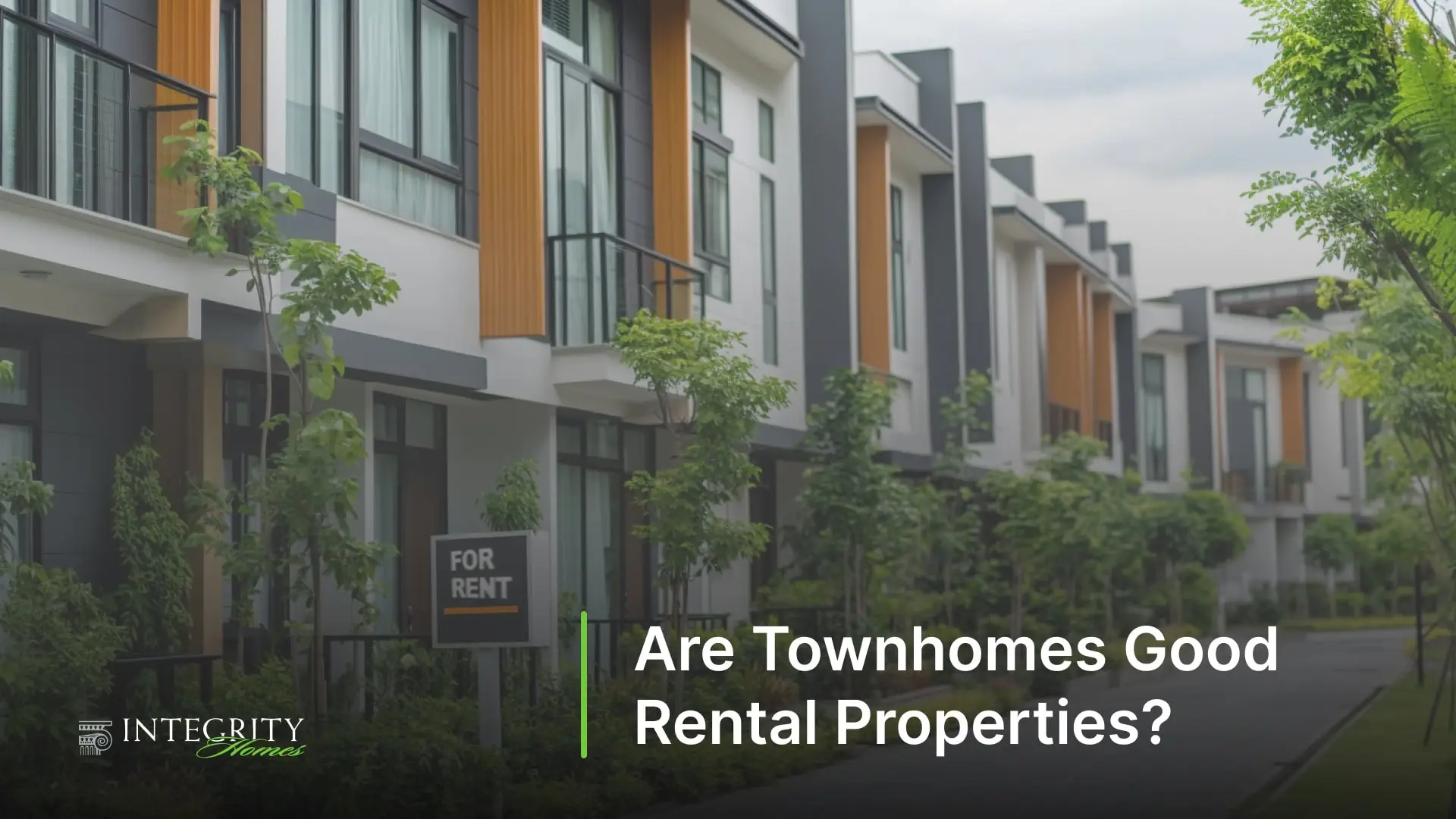
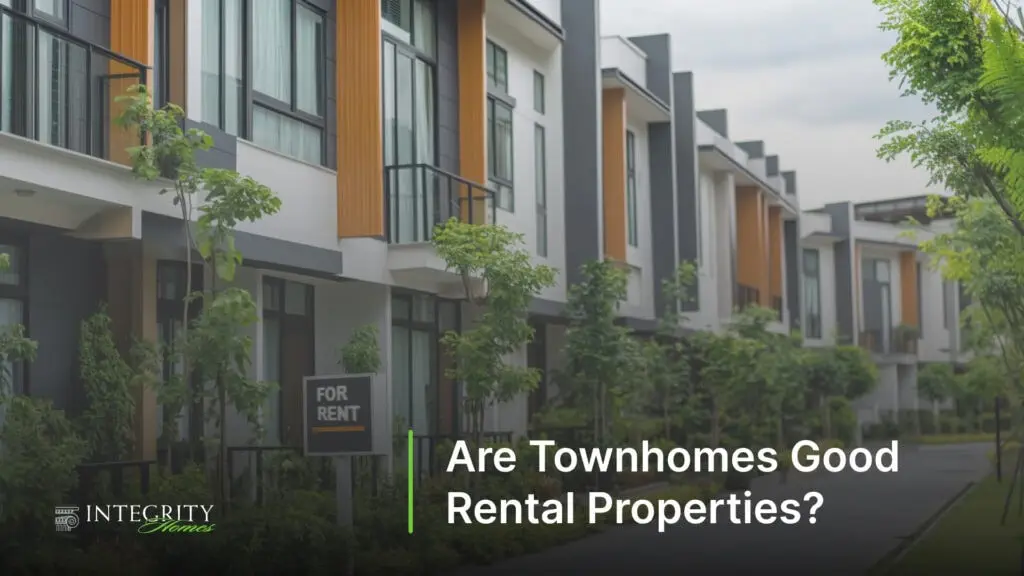
Undoubtedly, townhomes make for excellent rental properties. They provide cost-effectiveness, a strong demand from tenants, and steady rental income. This piece will navigate you through the various advantages of investing in townhomes, including their economic perks and attractiveness to renters, as well as address any possible obstacles one might encounter.
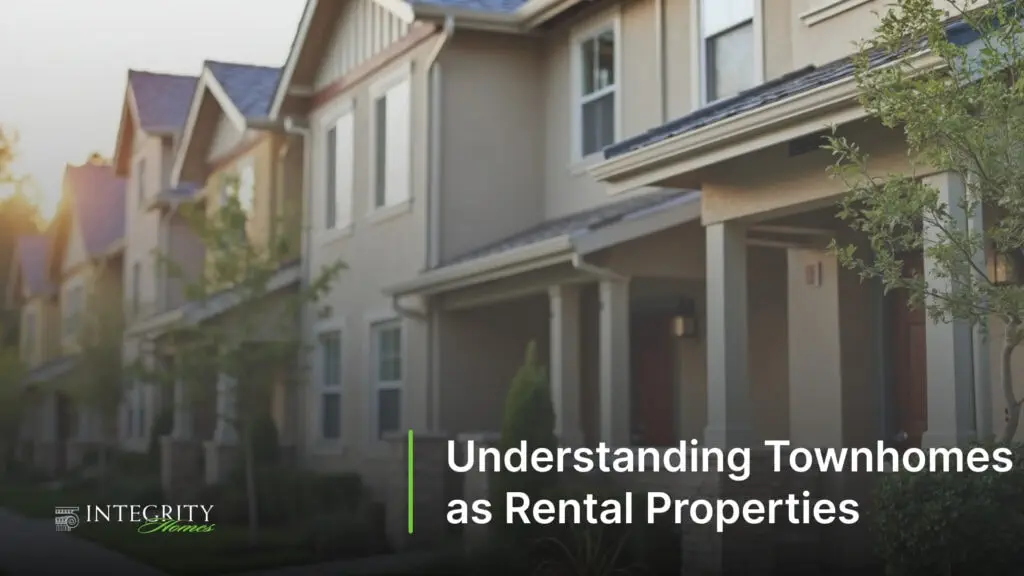
Townhomes offer a distinctive choice for those interested in rental properties, as these residential units combine features of individual homes and condominiums. Sharing at least one common wall with neighboring units, townhomes usually span multiple stories and provide owners with the title to the land their unit occupies. This can augment an owner’s sense of responsibility and personal stake in maintaining their property.
In contrast to condos, each townhome typically offers its own exclusive entryway which bolsters tenant privacy and autonomy. These communities frequently boast appealing amenities like fitness centers along with services such as exterior upkeep coordinated by homeowners associations (HOAs), thereby simplifying certain aspects of property management for residents.
The combination of private living spaces, ownership perks akin to single-family houses, communal benefits similar to condo developments, and attractive facilities managed through HOAs make townhouses a desirable real estate option that caters well both for prospective tenants’ preferences and investors’ portfolios.
Townhome buyers often benefit from a unique ownership structure, one of the key features that set townhomes apart from condominiums. Unlike condo owners, those who own townhouses usually have rights to the land beneath their homes.
With multiple floors in most townhomes, residents enjoy private and distinct living areas which are not typical in single-level condo apartments. The Homeowners Association (HOA) fees associated with owning a townhouse tend to be less expensive than for condos, providing an economically attractive alternative for prospective homeowners.
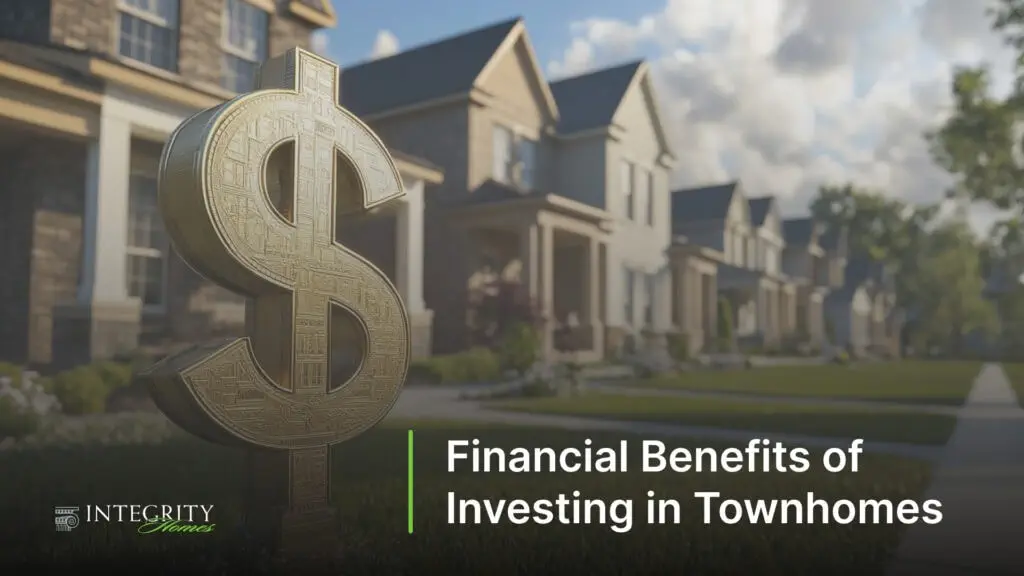
The real estate market presents a host of opportunities for investment, and townhomes stand out as an increasingly appealing option due to their financial advantages. Notably, the entry barrier is lower since they often come at a more affordable price compared to single-family homes, thus enabling new investors with limited funds to partake in property investment. The prospect of consistent rental income alongside the potential for growth in value contributes to their allure as an excellent choice for an investment property.
When it comes to investing in townhomes, the answer is the same. It’s imperative that real estate investors take into account recurring costs like HOA fees, maintenance expenses and property taxes. Even when these additional expenditures are factored in though. The reduced upkeep needs and greater affordability can lead to enhanced profit margins relative to other types of properties.
Townhome investments also benefit from strong marketplace demand, particularly within urban localities where cost-effectiveness meets convenience adding another layer of affirmation that they constitute a sound investment within the realm of real estate.
Considering townhomes as your next investment property is particularly appealing due to their affordability relative to single-family homes. Typically, these properties are priced lower, making them a viable entry point for both novice investors and first-time homebuyers. The financial advantage here lies in the lesser amount of capital required upfront, thus preserving liquidity and allowing for greater diversification within your portfolio.
Within the realm of today’s housing market, one can often find that townhomes offer more amenities at a similar price point compared with single-family houses. Benefits such as shared facilities maintenance and other community features enhance their value proposition. This mix of cost-effectiveness alongside attractive perks positions townhomes as an excellent investment choice—optimal for those aiming to maximize returns while keeping initial expenses low.
Townhomes provide a reliable source of rental income for real estate investors, largely because they are in high demand among young families and professionals. These groups are attracted to the mix of affordability and space that townhomes offer, which guarantees an ongoing flow of prospective tenants. This steady interest aids in sustaining high occupancy rates, securing a consistent income stream from real estate investments.
Investing in townhomes can be a strategic move for those seeking long-term returns, as these properties often exhibit strong appreciation potential and resale value, especially in areas with high demand. While the rate of value increase for townhomes may not always match that of single-family homes, their affordability coupled with an uptick in urban demand can contribute to notable growth over time.
Location and community desirability play critical roles in determining the resale value of townhomes. Properties situated within regions where there’s a robust market for medium density housing at affordable price points typically experience more substantial rates of appreciation. Consequently, choosing to invest in such property types can prove beneficial for individuals aiming to leverage market trends and secure investment properties with promising financial prospects.

Townhouse investment profitability is influenced by a variety of costs that townhome owners must account for. These expenses often encompass mortgage installments, property taxation, insurance coverage for the property, as well as homeowners association (HOA) fees. Financial responsibilities include taking care of the exterior upkeep—such as maintenance of the roof and landscaping—which contribute to continuous outlays.
Grasping these financial obligations is essential in determining the enduring worth and profit potential associated with investing in a townhome.
Townhome owners must consider homeowners association (HOA) fees as a key part of their ownership responsibilities. These fees, paid monthly, typically address community maintenance costs such as exterior upkeep, controlling pests and caring for the landscape. They also include routine tasks like lawn service and roof cleaning that would otherwise be the responsibility of individual property owners. As an investment option, townhouses are often favored due to their lower HOA fees with condominiums.
It should be observed though that these HOA fees can fluctuate depending on the range of services provided by the homeowners associations. There may also be additional special assessments levied by some associations for substantial repairs that go beyond regular maintenance activities. For those owning townhomes, it is crucial to comprehend what exactly fees cover and how they influence the financial gains from your property investment.
Investing in townhomes can be more financially advantageous due to the reduced insurance costs compared to other types of properties. When combined with lower maintenance expenses, these decreased insurance rates enhance both the affordability and profitability of owning a townhome property.
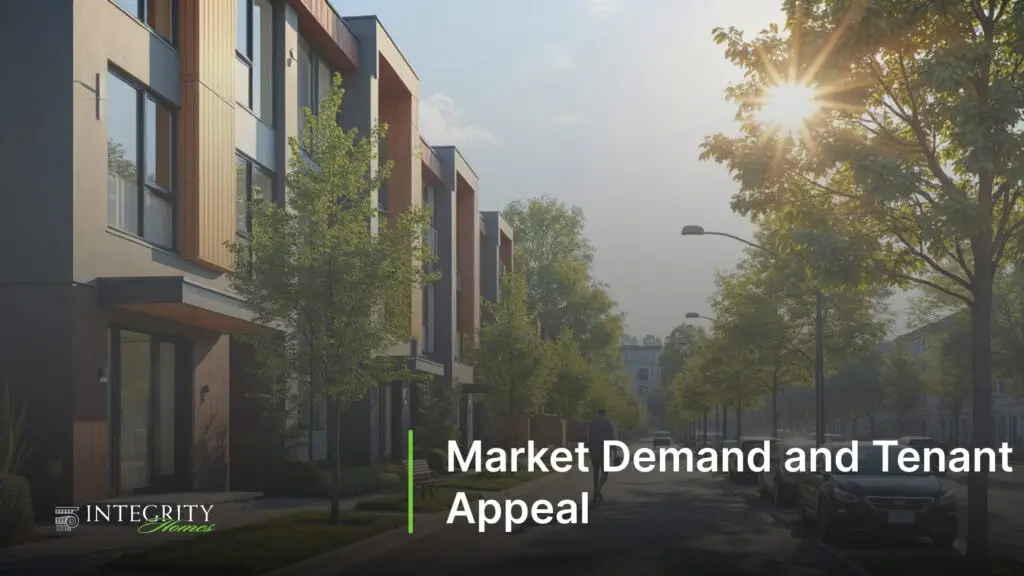
Young professionals and small families are particularly drawn to townhomes when searching for rentals, due to their economical nature, ample space, and the advantages of urban living. When equipped with coveted amenities, these well-kept townhomes can draw in a varied group of renters, which assures a steady flow of rental income.
Community perks like swimming pools and fitness centers raise the appeal level for prospective tenants. This mix of city accessibility at an affordable price point—alongside such facilities—renders townhomes a compelling choice for all kinds of renters while boosting their investment value over time.
Townhouses have become a popular choice among Millennials and Generation Z for the balance they offer between affordability and ample living space. In tech-centric urban locations, where there is a high concentration of young professionals and small families in search of cost-effective housing that doesn’t skimp on features, townhomes are particularly sought after. The addition of garages, basements, or private yards can make these homes even more attractive to such groups.
In metropolitan areas like Washington, D.C., Orlando, Miami, and Fort Lauderdale, there’s an especially strong demand for townhome rentals. These cities provide an ideal mix of reasonable pricing coupled with the perks of city life—qualities that render townhouses especially appealing to young families and professionals looking for a functional yet comfortable dwelling place.
Often boasting an array of lifestyle amenities, townhome communities can outshine traditional single-family homes in appeal. The inclusion of swimming pools, fitness centers, and shared outdoor spaces enhances the living experience significantly. Such amenities draw in dependable tenants who are likely to stay for extended periods.
In these communities, homeowners associations (HOAs) are instrumental in managing both community features and consistent exterior maintenance. This persistent care by HOAs amplifies the appeal of townhomes as a solid choice for real estate investors aiming to secure long-term tenants.
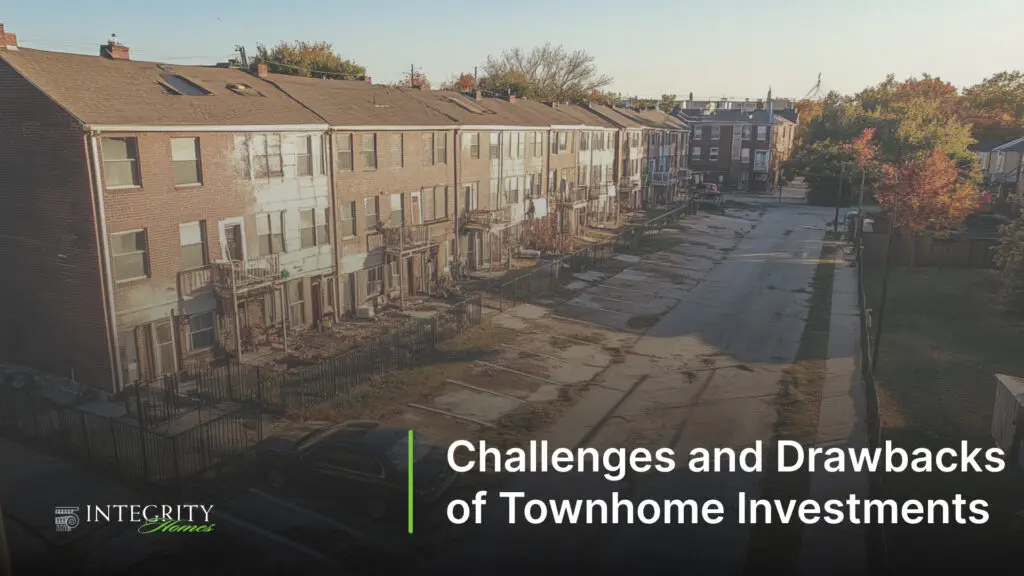
Investors need to weigh both the advantages and obstacles when considering townhomes. The fact that these properties have shared walls might result in disturbances due to noise, as well as a decrease in privacy for tenants, potentially making it less appealing to some prospective renters.
Managing investment property within a townhome complex can become more complicated due to stringent HOA rules which may influence both how the property is managed and tenant contentment.
The common walls in a townhouse can create potential noise concerns, which may impinge on the privacy and contentment of residents. The sound from adjoining homes could pose an issue for those seeking a more peaceful domicile. It’s vital that owners of these properties implement soundproofing strategies to address this problem.
Having shared walls might limit how much tenants can influence their living space conditions, potentially discouraging certain individuals. Recognizing such hurdles is key for real estate investors who are considering townhouses as investment options within the rental property market.
Strict HOA rules can also pose challenges for townhome investors. These regulations can significantly affect property management and tenant satisfaction by enforcing compliance and maintenance standards. It’s crucial to review the HOA’s bylaws before closing on a townhouse to fully understand the rules and restrictions that may apply.
HOA fees can add to the monthly costs of townhouse investments, impacting overall profitability. Understanding the scope of these rules and fees is essential for investors to make informed decisions and ensure that the investment aligns with their financial goals.
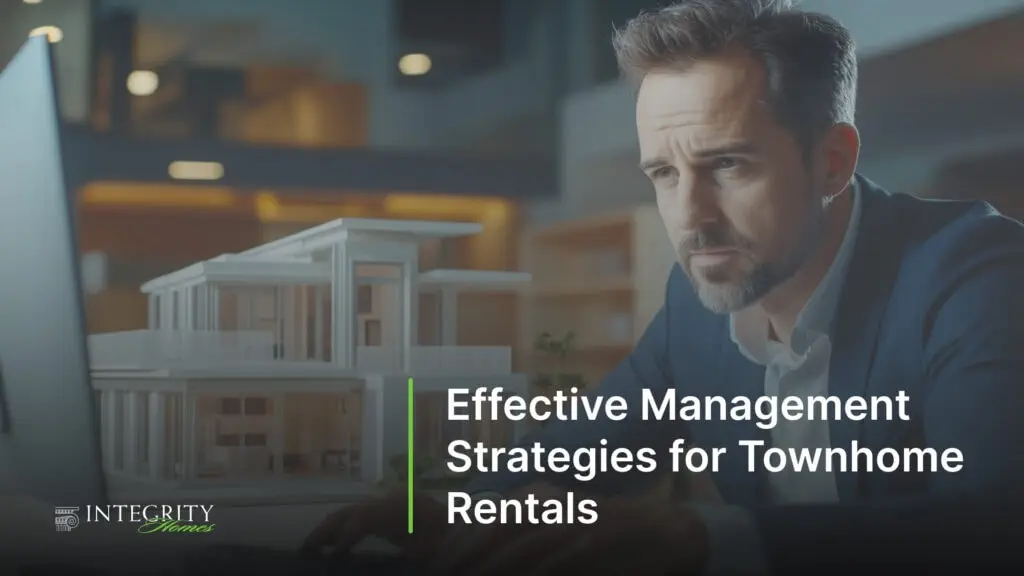
Maximizing the benefits of investing in townhomes is contingent upon effective management. This includes maintaining open lines of communication with tenants, and performing consistent maintenance to make operations more efficient. Ensuring satisfaction among tenants and keeping up with property care boosts the investment’s overall profitability.
Effective communication fosters trust and expedites the resolution of issues for tenants. Consistent upkeep is essential to preserve the condition of a property and boost tenant loyalty.
The reduced maintenance demands that come with townhomes can improve the experience and contentment of tenants, which often results in extended tenancies and favorable feedback.

When contemplating the addition of a townhouse to your investment portfolio, it is critical to weigh the advantages and disadvantages. The purchase can be beneficial in a favorable housing market, providing an attractive mix of cost-effectiveness, sought-after amenities, and steady rental income. Yet, one must also account for potential negatives like reduced privacy and stringent HOA rules.
Enlisting the expertise of a skilled real estate agent will prove instrumental when acquiring a townhouse by offering insight into navigating through the intricate landscape of real estate properties within the housing market.
When assessing the potential for profit in a townhouse investment, it is imperative to conduct comprehensive market analysis and take into account any prospective developments. Important elements to weigh are the attraction of the location, demand for rentals, costs associated with HOA fees, prospects for property value growth, and the current state of the property.
Careful examination of the area along with determining whether to pursue a conventional lease or an Airbnb rental strategy is essential in optimizing your investment’s return possibilities.
Grasping the concepts of cash flow and ROI is crucial when evaluating the success of investments in townhomes. Cash flow signifies the amount remaining from rental income once all deductions for expenses, including mortgage installments and costs for upkeep, are made. To compute cash flow, one must deduct forecasted expenditures from the anticipated rental charges.
Investing in the real estate market by purchasing townhomes has shown to be a lucrative approach, presenting an attractive mix of reasonable pricing, consistent rental income streams, and potential growth in value. Townhomes are particularly attractive for young families and working professionals due to their design and affordability, which leads to sustained demand that can help ensure regular rental payments from tenants. It’s crucial for investors to take into account the possible difficulties associated with owning such properties like having shared walls with neighbors and dealing with strict HOA rules when making investment choices.
To sum up, townhomes stand as a solid choice for those seeking to expand their property investments. An investor’s ability to reap substantial financial gains hinges on grasping the economic rewards involved, understanding cost implications including market trends along with adopting efficient ownership practices allows one also factor into achieving successful outcomes within this segment of housing. Regardless if you’re just beginning your journey in investing or possess extensive experience within the field of real estate management – engaging effectively across today’s housing landscape makes townhomes a strategically viable option worth considering.
Particularly for those entering the investment field for the first time, townhomes can serve as a robust investment choice due to their affordability compared to single-family homes and their potential to generate consistent rental income.
Townhome owners need to account for several significant expenses, which include payments on their mortgage, taxes associated with the property, insurance coverage for their residence, and fees required by homeowners’ associations (HOA).
Understanding these costs is crucial when evaluating the economic impact of townhome ownership.
The financial implications of HOA fees on investments in townhomes can be substantial, as they add to the monthly outgoings and could impinge on net gains.
When assessing prospective yields, it is vital for investors to take these charges into account.
Young families and professionals find townhomes attractive because they offer a balance of affordability, spaciousness, and desirable amenities along with the advantages of urban living.
Such a mix caters to individuals in search of functionality while not compromising on their way of life.
By maintaining transparent communication with renters, and conducting consistent upkeep of the property, investors can adeptly oversee townhome rental properties.
Such a strategy improves operational efficiency while simultaneously boosting the satisfaction levels of tenants.
Maryland | Frederick, MD | National Harbor, MD | Potomac, MD
Virginia | Alexandria, VA | Fairfax, VA | Lorton, VA | Northern, VA | Stafford, VA | Stephenson, VA | Winchester, VA | Washington DC